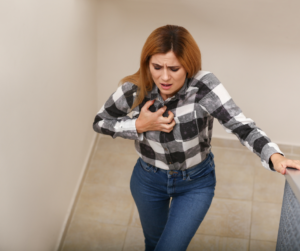Anxiety and panic attacks are two common manifestations of anxiety disorders that can cause significant distress and disruption in daily life. While these terms are often used interchangeably, there are distinct differences between anxiety attacks and panic attacks. In this article, we’ll explore the characteristics of each, their potential triggers, and effective management strategies. Additionally, we’ll discuss the role of hypnosis in alleviating symptoms and promoting overall well-being.

Differentiating Anxiety Attacks vs. Panic Attacks
Anxiety attacks and panic attacks share some similarities, such as intense feelings of fear or discomfort and physical symptoms like rapid heartbeat, sweating, and trembling. However, there are key differences in their onset, duration, and triggers.
Anxiety Attacks: Anxiety attacks, also known as anxiety episodes or anxiety crises, typically arise in response to specific stressors or triggers. These triggers can vary widely from person to person and may include social situations, work-related stress, or financial concerns. Symptoms of an anxiety attack may include:
- Excessive worry or apprehension
- Muscle tension
- Restlessness or irritability
- Difficulty concentrating
- Fatigue or feeling drained
Anxiety attacks tend to develop gradually and may last for an extended period, ranging from several minutes to hours or even days. Individuals experiencing an anxiety attack may feel overwhelmed by their symptoms but can usually identify the underlying cause or trigger.
Panic Attacks: Panic attacks, on the other hand, often occur suddenly and unexpectedly, without an identifiable trigger. These episodes are characterized by intense feelings of fear or impending doom and a surge of physical symptoms, including:
- Chest pain or discomfort
- Shortness of breath or feelings of suffocation
- Dizziness or lightheadedness
- Nausea or abdominal distress
- Sweating or chills
- Trembling or shaking
Panic attacks typically reach their peak within a few minutes and may subside relatively quickly. However, the intensity of symptoms can be overwhelming, leading individuals to fear that they are experiencing a medical emergency or losing control.
Hypnosis, or hypnotherapy, is a therapeutic technique that involves inducing a trance-like state of deep relaxation and heightened focus. During hypnosis, individuals are more receptive to positive suggestions and can explore and address underlying issues contributing to their anxiety or panic symptoms. Hypnosis can be an effective tool in managing anxiety and panic attacks for several reasons:
- Addressing underlying trauma: Hypnosis can help individuals identify and process past traumas or negative experiences that may be contributing to their anxiety or panic symptoms.
- Changing negative thought patterns: Hypnosis can help individuals challenge and reframe negative thought patterns and beliefs, promoting a more positive outlook and reducing feelings of fear or apprehension.
- Learning relaxation techniques: Hypnosis induces a state of deep relaxation, allowing individuals to practice relaxation techniques that can help alleviate symptoms of anxiety and panic.
- Building coping skills: Through hypnosis, individuals can learn and reinforce coping skills to manage stress and anxiety more effectively in their daily lives.
While anxiety attacks and panic attacks share some similarities, they differ in their onset, duration, and triggers. Understanding these differences is essential for accurate diagnosis and effective management. Additionally, hypnosis can be a valuable adjunct therapy in alleviating symptoms and promoting overall well-being for individuals struggling with anxiety or panic disorders.
If you or someone you know is experiencing anxiety or panic attacks, consider seeking support from a qualified mental health professional who can provide guidance and resources for managing symptoms effectively. Remember, you are not alone, and help is available.
Get a free copy of my program, The Power of Your Unconscious Mind. It will explain where the anxiety comes from and how we can get rid of it.
